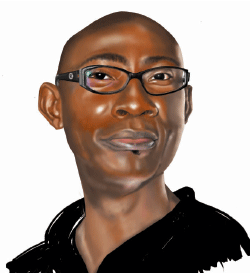Today, Ebola is believed to be one of the most fatal diseases ravaging the world. And like many other terminal ailments, it has surfaced in Africa’s most populous country, Nigeria.
I feel highly disturbed about the Ebola virus outbreak in Nigeria which, of course, is also raging across parts of West Africa such as Liberia, Sierra Leone and Guinea.
Ever since the outbreak of the disease was confirmed in Nigeria’s biggest city of Lagos, following the visit, hospitalisation and eventual death of a Liberian-American, Patrick Sawyer, many others who had primary or secondary contact with him have contacted the virus which cure is still a mirage.
Sawyer had flown to Nigeria in late July and died soon after at First Consultant Medical Centre, Lagos. He reportedly infected at least eight persons, including the nurse who attended to him, who died on August 5.
Health officials in Nigeria have announced 10 confirmed cases as a result of primary contact with Sawyer and two deaths.
On Wednesday, August 6, Information Minister, Labaran Maku, announced that “all those who have had primary contact have been quarantined. Secondary contacts have also been traced. So far, the number of people that have been traced is 198, out of this number, 177 are in Lagos and are being traced. Some are in quarantine, some are being monitored by health specialists. Twenty one persons in Enugu are also watched.
“This is because one of the nurses that was involved with the treatment of the index case, unfortunately, disobeyed medical instructions and somehow travelled to Enugu. All those who she was in contact with, including her husband, are under quarantine. The medical team has been able to trace all those who made contact with her.”
As of July 20, no fewer than 1,093 persons in Guinea, Sierra Leone and Liberia were believed to have contacted Ebola. More than 900 of them are believed to have died, and worse of it all is that the vaccine for its cure is not easy to come by, though researchers have been working to find a solution.
The concern which many have shown stems from the fact that Nigeria is Africa’s largest economy and is deeply connected to the outside world for several reasons linked to politics, religion culture, among others.
When, therefore, President Goodluck Jonathan and other government officials at the federal and state levels show concern over the spread of the virus, they are guided more by what the country stands to lose if the outbreak is not contained.
Nigerians are very mobile people. Coupled with this is their penchant to catch up with the gains of globalisation in pursuit of profession and trade.
Globalisation ensures people are mixing more, trading more and handling more farm animals and agricultural produce in industrial settings – all of which have the potential of facilitating the spread of infectious diseases like the raging and ravaging Ebola.
Jeffrey D. Sachs, Economist and Director of the Earth Institute at Columbia University said: “Rapid epidemic transmission has been with us a long time, but my guess is that it’s accelerating, with the number of people on the move and intensity of air travel, global trade, and the numbers of displaced people we have globally.
“Climate change, population growth and an increase in displaced populations means that people are pushing into previously uninhabited places, creating new vulnerabilities and bringing humans into closer contact with animal populations, where many of the diseases have begun.”
So far, the management of the Ebola virus by government and health officials since its discovery in Nigeria has not been abysmal. Health Minister, Onyebuchi Chukwu, and Lagos State Health Commissioner, Jide Idris, have demonstrated capacity and willingness to control the virus from spreading beyond confined arenas despite other factors beyond their control.
But there is fear that Nigerians are ready to make money from the disease rather than use their God-given positions to help check the spread.
Where I come from, mere commiserating with the sick can speed up recovery. And in the current circumstance with the Ebola disease, commiseration can be expressed in different forms, but some Nigerians are looking at the bottom line of their businesses instead of how they can help to cushion the effect of Ebola.
The emergence of the virus in Lagos with more than 20 million residents has thrown up such issues like what could be done to escape infection. In churches, mosques, schools, town unions, offices, Nigerians have been tutored on what remedies could be handy.
One of the commonest modes is the washing of hands with soap or the use of hand sanitiser by those who can afford it. Hand sanitiser comes in different sizes but the most patronised is the pocket-size which is easy to carry about.
Before the Ebola madness, a Dettol pocket-size hand sanitiser made by Reckit Beckister sold for about N300. Unfortunately, the situation has changed following news of the spread of Ebola and the high demand for pocket hand sanitisers.
The big pharmaceutical stores in Lagos are making a kill from Ebola, selling for N1,000 the same product which a few weeks back sold for N300. They claim that the manufactures now sell it for over N800.
This can only happen in Nigeria where the quest for money and material things is placed far above any other thing, the consequences notwithstanding.
Since the Ebola pandemic has gripped some African countries, other nations outside of Africa, particularly the United States of America, are concerned about how to help stop this wastage of human capital.
A vaccine still undergoing research in Canada was airfreighted to Liberia for the sake of saving the victims.
It beats one’s imagination that instead of manufacturers of a germ preventive sanitiser to crash the price as part of their cooperate social responsibility (CSR), their concern is the profit from the pain of fellow countrymen and women.
They are in business to make money, but must money making be at the detriment of lives? Where then is our belief in our brother’s keeper? By the way, is the outbreak going to last forever? What will it benefit manufacturers of Dettol if they make all the money now and the consequences of their action lead to their being isolated by more than 150 million Nigerians tomorrow?
What sort of encouragement are we giving to the caregivers from the World Health Organisation (WHO) and other volunteer bodies sacrificing everything for the sake of all?
Frank Mahoney, an epidemiologist leading the Centre for Diseases Control (CDC’s) Ebola response in Lagos said “Nigerians understand the magnitude of the problem here.
“International health officials are undertaking a substantial effort in Nigeria, motivated by what might happen if the disease, which had been confined to remote forests and villages in decades past, starts to spread in one of Africa’s most densely populated countries.
“We are very worried about this. Nigeria’s health care system could easily become overwhelmed. Lagos is such a huge city with such a mobile population.”
As Sachs said, “this ought to force a reflection,” because if we must set up a network of community health workers across the developing world, Nigeria inclusive, urgent priority ought to be given to how not to take advantage of other people’s woos.
It simply amounts to killing them twice.













